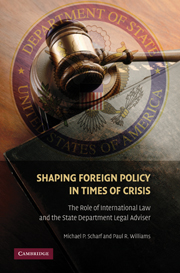 Shaping Foreign Policy in Times of Crisis
Shaping Foreign Policy in Times of Crisis Book contents
- Frontmatter
- Contents
- Acknowledgments
- Foreword: America's Conscience on International Law
- Introduction
- SHAPING FOREIGN POLICY IN TIMES OF CRISIS
- 1 The Compliance Debate
- 2 A Brief History of L
- 3 The Path to L
- 4 The Carter Administration – Herbert J. Hansell (1977–1979)
- 5 The Carter Administration – Roberts B. Owen (1979–1981)
- 6 The Reagan Administration – Davis R. Robinson (1981–1985)
- 7 The Reagan and Bush Administrations – Abraham D. Sofaer (1985–1990)
- 8 The Bush (41st) Administration – Edwin D. Williamson (1990–1993)
- 9 The Bush (41st) Administration – Michael J. Matheson
- 10 The Clinton Administration – Conrad K. Harper (1993–1996)
- 11 The Clinton Administration – David R. Andrews (1997–2000)
- 12 The Bush (43rd) Administration – William H. Taft IV (2001–2005)
- 13 The Bush (43rd) Administration – John B. Bellinger III (2005–2009)
- 14 Department of State Legal Advisers' Roundtable
- 15 Foreign Legal Advisers' Roundtable
- 16 Lawyering the Treatment of Detainees in the War on Terrorism
- 17 Conclusion
- Glossary of Terms
- Notes
- Annex: Legal Advisers of the U.S. Department of State
- Select Bibliography of Legal Scholarship by Department of State Legal Advisers
- About the Authors
- Other Books by the Authors
- Index
10 - The Clinton Administration – Conrad K. Harper (1993–1996)
Published online by Cambridge University Press: 05 June 2012
- Frontmatter
- Contents
- Acknowledgments
- Foreword: America's Conscience on International Law
- Introduction
- SHAPING FOREIGN POLICY IN TIMES OF CRISIS
- 1 The Compliance Debate
- 2 A Brief History of L
- 3 The Path to L
- 4 The Carter Administration – Herbert J. Hansell (1977–1979)
- 5 The Carter Administration – Roberts B. Owen (1979–1981)
- 6 The Reagan Administration – Davis R. Robinson (1981–1985)
- 7 The Reagan and Bush Administrations – Abraham D. Sofaer (1985–1990)
- 8 The Bush (41st) Administration – Edwin D. Williamson (1990–1993)
- 9 The Bush (41st) Administration – Michael J. Matheson
- 10 The Clinton Administration – Conrad K. Harper (1993–1996)
- 11 The Clinton Administration – David R. Andrews (1997–2000)
- 12 The Bush (43rd) Administration – William H. Taft IV (2001–2005)
- 13 The Bush (43rd) Administration – John B. Bellinger III (2005–2009)
- 14 Department of State Legal Advisers' Roundtable
- 15 Foreign Legal Advisers' Roundtable
- 16 Lawyering the Treatment of Detainees in the War on Terrorism
- 17 Conclusion
- Glossary of Terms
- Notes
- Annex: Legal Advisers of the U.S. Department of State
- Select Bibliography of Legal Scholarship by Department of State Legal Advisers
- About the Authors
- Other Books by the Authors
- Index
Summary
LET ME BEGIN BY RETURNING TO ONE OF THE TOPICS MIKE Matheson has touched on. The statute of the Yugoslav tribunal was in its infancy when I took office. It had been adopted by the Security Council on May 25, 1993; a day or two before then, I was sworn in. I had not realized that my first year at L would be dominated almost entirely by this undertaking that Mike and his colleagues had crafted, but that turned out to be the case; we found ourselves with a marvelous document, but then our project was to create a reality.
Operation of the Yugoslav Tribunal
You would assume perhaps that the international legal community would be a rich source of people ready for such an undertaking, but it turned out, at least on my watch, not to be the case. The first challenge was to get anything started. Nobody today has said anything about the difficulty of getting the United Nations to do anything. But we realized early on that if this tribunal was going to begin to work, and that the designated location turned out to be The Hague, people had to be there; materials had to be there; and somebody had to get those people and materials to The Hague to start working – and that somebody, of course, was the United States.
- Type
- Chapter
- Information
- Shaping Foreign Policy in Times of CrisisThe Role of International Law and the State Department Legal Adviser, pp. 103 - 112Publisher: Cambridge University PressPrint publication year: 2010
